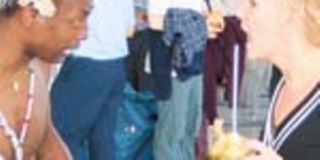KWS chief removed in jobs scam

Mr Bakari Baya welcomes Ms Brenda Nelson, one of the 270 tourists who arrived from the UK, yesterday, with a 'madafu' palm fruit when the visitors landed at the Moi International Airport in Mombasa.
Kenya Wildlife Services director Evans Mukolwe was suspended yesterday as Anti-corruption detectives launched investigations into a game ranger recruitment scandal involving Cabinet ministers and MPs.
He was removed as details emerged of a recruitment fiasco in which KWS ended up employing 980 trainee game rangers instead of the 460 required by the Government amid interference by politicians.
Senior Kenya Anti-Corruption Commission detectives visited KWS headquarters in Nairobi and questioned him for 30 minutes. He will record a statement later.
Another squad of detectives was sent to the KWS training school in Manyani, Coast province, to interview officers in charge of the camp and the 520 extra recruits forced on the college by politicians.
It is understood the investigations could lead to criminal charges and a wide-ranging shake-up of the Service, which only four months ago was involved in a major privatisation controversy, leading to the removal of its chairman, Mr Collin Church.
His suspension was confirmed to journalists by Minister Raphael Tuju, who has been handling the Tourism and Wildlife Portfolio since the death of Mr Karisa Maitha.
Preliminary investigations showed that 460 trainees were properly recruited within the district quota laid out by the government but the extra 520 were admitted on the recommendation of politicians or after paying hefty bribes.
About 90 per cent of the 520 recruits come from one province.
It has emerged that a wildlife official approached Cabinet ministers, MPs and senior Government officials and invited them to send their candidates during the recent recruitment.
Each of the politicians were issued with blank admission letters depending on their importance or influence.
The politicians rushed to their villages and hand-picked their relatives and friends and issued them with the bank admission letters.
While the 460 recruits went through a rigorous interview – which covered academic qualifications, criminal record and medical –the 520 who were brought by politicians never underwent any tests.
After filling in the blank admission letters, they were simply presented to the KWS training school in Manyani together with the 460 genuine recruits.
The Anti-corruption authority was alerted to the strange goings-on at KWS last month after when the Manyani training school found itself with double the number of students it had been expecting.
Detectives have been studying correspondence between the Ministry of Tourism and WIldlife, KWS headquarters, authorities at the Manyani training camp and Treasury on the rangers saga.
They said the Government was to finance the training of 400 rangers while donors were to meet the expenses of the other 60.
But now, the Manyani training school is faced with a crisis of accommodation, training facilities and instructors due to the huge enrolment.
Yesterday, KACC detectives asked authorities at Manyani to produce records of the 980 recruits in order to identify the 520 politically-connected candidates.
The recruitment notice – published on August 27 in the newspapers – said successful applicants would undergo a six-month intense paramilitary training at Manyani school.
It stated when, where and how the interviews were to take place in all the districts between August 30 and September 21.
Among other requirements, applicants should have attained a mean grade D in KCSE. They also had to be aged between 18 and 25 years and be five feet eight inches tall for men and five feet and six inches for women. The notice required candidates to be of good unaided eyesight, good health and physique, be a native of the recruitment district must not have a criminal record.
Interviews were done in open fields and candidates were asked to carry with them the original academic certificates, identity card and other testimonials.
"There is a likelihood that the extra 520 recruits will be asked to leave because they were not interviewed and they are an extra burden to taxpayers," a senior official said.
There are security concerns too. Senior officials in the Ministry of Tourism and Wildlife say it was likely that people with criminal records found their way into the KWS through the intake, a dangerous development because rangers are normally issued with firearms.
"The firearms are issued to fight off poachers but crooks might use them in robberies," a ministry official said.
The KWS has had a troubled history, leading to a high turnover of its directors.
Mr Mukolwe replaced Mr Michael Wamithi, who was sent packing by Minister Newton Kulundu, over dealings initiated in 2002 by former KWS director Richard Leakey and a former World Bank country director for Kenya, Harold Wackman, to set up a $400 million conservation fund for the three East African countries.
Mr Wamithi, the minister said, was suspended pending investigations into insubordination charges and travelling to Uganda using a KWS helicopter without approval from the ministry on April 22, last year, to attend a consultative meeting on the proposed fund.
His three predecessor, Mr Nehemiah Rotich, Mr David Western and Dr Richard Leakey were also hounded out office in politically-charged circumstances.
Since 1989, when KWS was established, the wildlife body has undergone several management changes.




